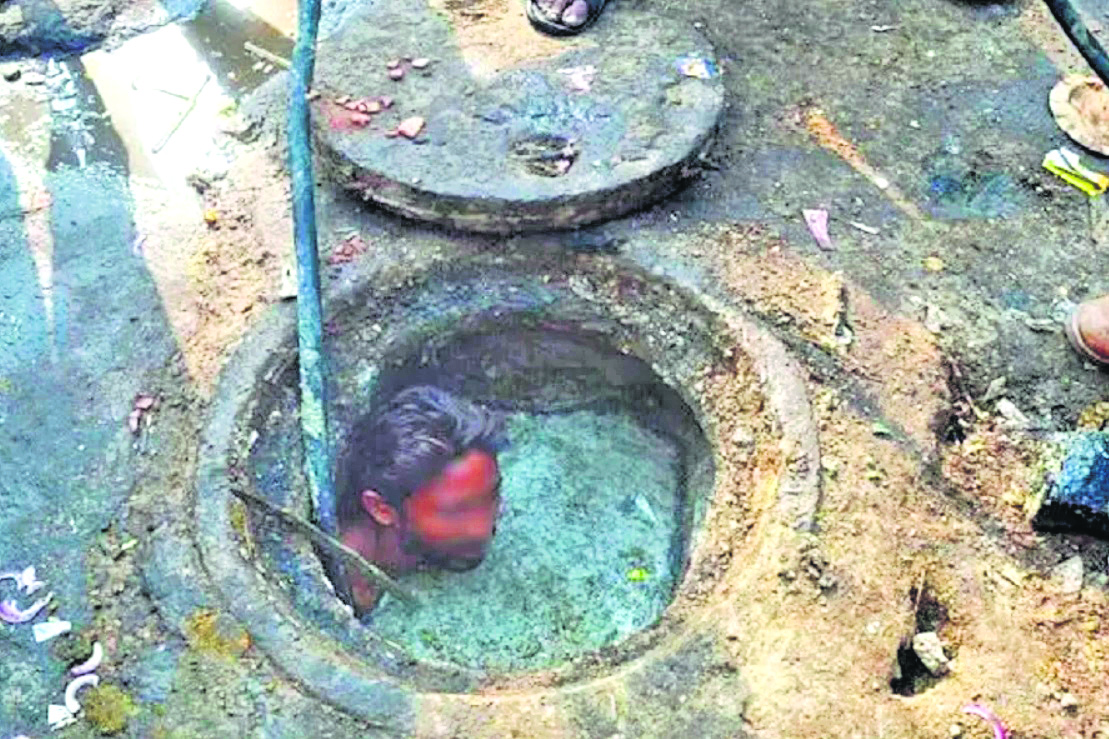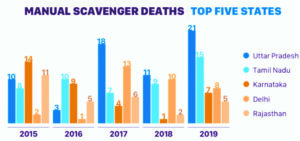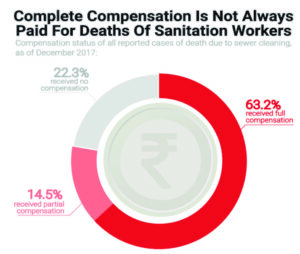
Thirty-eight districts are yet to declared themselves manual scavenging-free, according to official data. Responding to a question in Lok Sabha, Minister of State for Social Justice Ramdas Athawale said there is no report of people currently engaged in manual scavenging in the country.
According to official data shared by him, there are 38 districts across six states that have not yet declared themselves manual scavenging-free.
Thirteen of these districts are in Telangana, 10 in Madhya Pradesh, nine in Manipur, three in Assam, two in Maghalaya and one in Jharkhand, according to the data shared by him in a written response. He, however, added that there is no deadline for states to declare themselves manual scavenging-free.
Manual Scavenging
Manual scavenging is a term used mainly in India for “manually cleaning, carrying, disposing of, or otherwise handling, human excreta in an insanitary latrine or in an open drain or sewer or in a septic tank or a pit”. Manual scavengers usually use hand tools such as buckets, brooms and shovels. The workers have to move the excreta, using brooms and tin plates, into baskets, which they carry to disposal locations sometimes several kilometres away. The practice of employing human labour for cleaning of sewers and septic tanks is also prevalent in Bangladesh and Pakistan. These sanitation workers, called “manual scavengers”, rarely have any personal protective equipment. The work is regarded as a dehumanizing practice.
The term “manual scavenging” differs from the stand-alone term “scavenging”, which is one of the oldest economic activities and refers to the act of sorting though and picking from discarded waste. Sometimes called waste pickers or ragpickers, scavengers usually collect from the streets, dumpsites, or landfills. They collect reusable and recyclable material to sell, reintegrating it into the economy’s production process. The practice exists in cities and towns across the Global South.

Effects of Manual Scavenging
Health Hazards: Manual scavengers face significant health risks due to direct exposure to human waste and hazardous substances. They are at high risk of contracting diseases such as cholera, typhoid, hepatitis, and various respiratory infections.
The absence of protective gear and poor sanitation conditions further exacerbate the health hazards, leading to a higher incidence of illnesses and premature deaths among manual scavengers. Dignity and Human Rights Violations: Manual scavenging is a clear violation of the dignity and human rights of the individuals involved.
They are subjected to degrading and inhumane conditions, handling human waste with their bare hands and lacking access to basic sanitation facilities.
This occupation perpetuates social stigma, discrimination, and the marginalisation of affected communities reinforcing caste-based oppression.
Psychological and Emotional Trauma: Engaging in manual scavenging can have severe psychological and emotional effects on the individuals involved.
The constant exposure to filth, the indignity of the work, and the discrimination they face take a toll on their mental well-being. Manual scavengers often experience feelings of shame, low self-esteem, and depression, leading to long-term psychological trauma.

Reasons for continued prevalence of manual scavenging in India
Inefficient Sewage Management System: In India, most municipalities do not have the latest machines for cleaning the sewage systems and thus sewage workers are required to enter the underground sewerage lines through manholes.
The unskilled labourers, meanwhile, are much cheaper to hire and contractors illegally employ them at a daily wage. Caste-based social hierarchy: Manual scavenging has historically been associated with the caste system in India, where certain cases have been marginalised and forced into occupations considered “unclean” or “polluting.”















